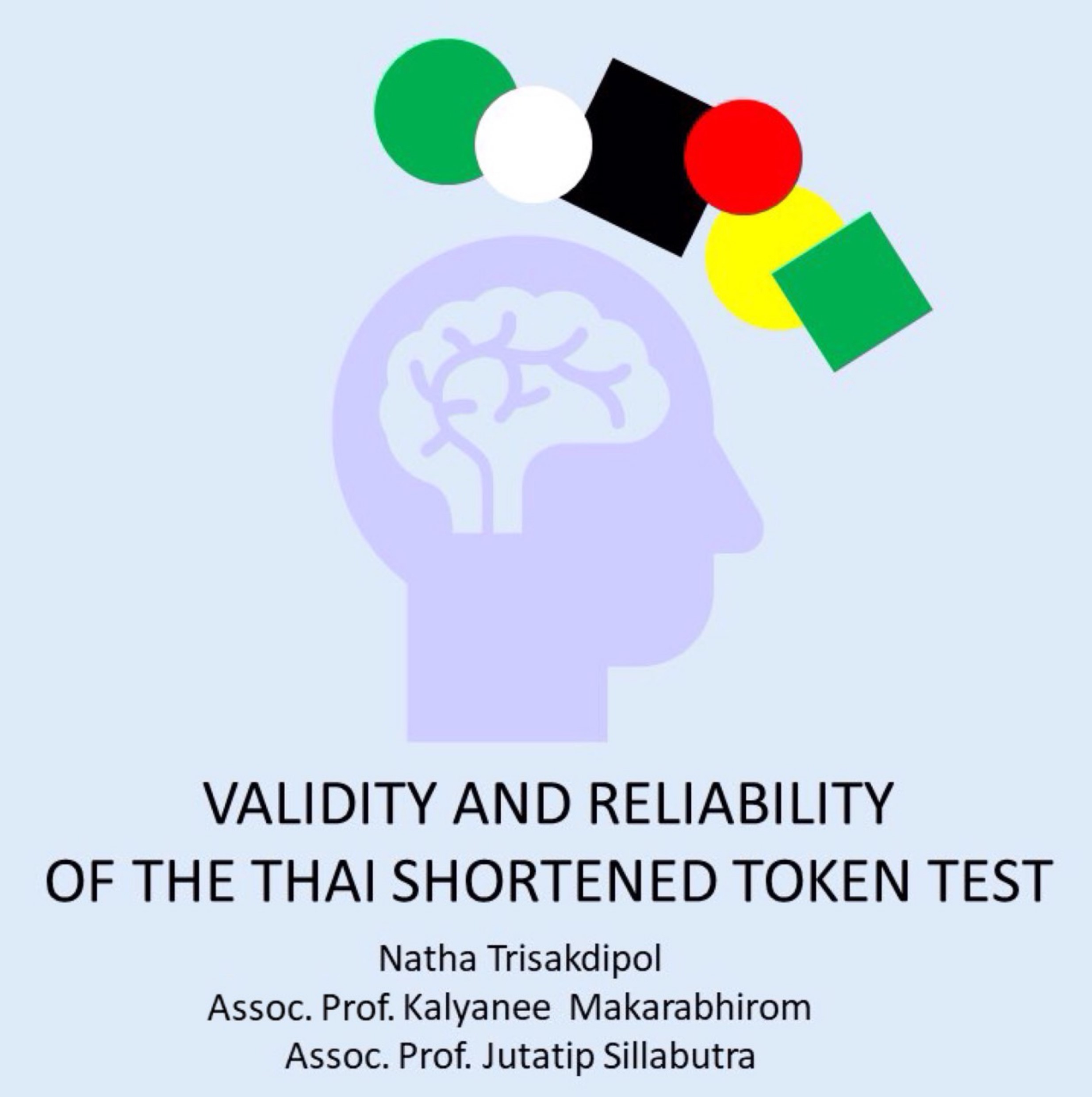Validity and reliability of the Thai Shortened Token Test
Main Article Content
Abstract
Background: The Token Test (TT) helps evaluate language comprehension in individuals with aphasia. This test can detect comprehension difficulties, even in mild aphasia cases. In Thailand, the other language tests for aphasia focused primarily on multiple aspects of language, which took a long time to evaluate. The Shortened TT, which has fewer commands, has been chosen to be translated for this study. Previously, the Shortened TT was translated into Thai using only forward translation and had not yet been evaluated for its psychometric properties. Thus, this study focuses on translating the Shortened TT into Thai using a forward and backward translation process and determining its validity and reliability.
Objective: To translate, validate, and determine the reliability of the Thai Shortened TT.
Materials and methods: The Shortened TT was translated using forward and backward translation. Following the completion of the translation process, five expert speech-language pathologists (SLPs) evaluated its content validity using the Content Validity Index (CVI), the Content Validity Index for Items (I-CVI), and the Content Validity Index for Scales (S-CVI). Then, it was administered to 12 normal participants and 12 aphasia participants to determine the test-retest, intra-, and inter-rater reliability using the Intraclass Correlation Coefficient (ICC).
Results: The Thai Shortened TT’s content validity was satisfied at CVI=0.920, I-CVI=0.800-1, and S-CVI=0.983. The test-retest, intra-, and inter-rater reliability were excellent. In the normal group, they were 0.943, 0.985, and 0.974, respectively; in the aphasia group, they were 0.985, 0.999, and 0.999, respectively.
Conclusion: This study indicated that the Thai Shortened TT can be utilized and is suitable for clinical evaluation regarding its content validity and reliability.
Article Details

This work is licensed under a Creative Commons Attribution-NonCommercial-NoDerivatives 4.0 International License.
Personal views expressed by the contributors in their articles are not necessarily those of the Journal of Associated Medical Sciences, Faculty of Associated Medical Sciences, Chiang Mai University.
References
Hallowell B. Aphasia and other acquired neurogenic language disorders: a guide for clinical excellence. San Diego, CA: Plural Publishing, Inc; 2017.
Babkair LA, Chyun D, Dickson VV, Almekhlafi MA. The effect of psychosocial factors and functional independence on poststroke depressive symptoms: a cross-sectional study. J Nurs Res. 2022; 30(1). doi: 10.1097/JNR.0000000000000464.
American Speech-Language-Hearing Association. Aphasia [cited 2024 Sep 9]. Available from: https:// www.asha.org/practice-portal/clinical-topics/aphasia.
Suwanwela NC. Stroke epidemiology in Thailand. J Stroke. 2014;16(1):1-7. doi: 10.5853/jos.2014.16.1.1.
Spreen O, Risser AH. Assessment of aphasia. New York: Oxford University Press; 2003.
De Renzi E, Vignolo LA. The token test: a sensitive test to detect receptive disturbances in aphasics. Brain. 1962; 85(4): 665-78. doi: 10.1093/brain/85.4.665.
De Renzi E, Faglioni P. Normative data and screening power of a shortened version of the token test. Cortex. 1978; 14(1): 41-9. doi: 10.1016/s0010-9452(78)80006-9.
Alkhamra RA, Al-Jazi AB. Validity and reliability of the Arabic Token Test for children. Int J Lang Commun Disord. 2016;51(2):183-91. doi: 10.1111/1460-6984. 12198.
Arvedson J, McNeil M, West TL. Prediction of revised token test overall, subtest, and linguistic unit scores by two shortened versions. Proceedings of 15th Clinical Aphasiology Conference; 1985 Jun 2-6; Ashland, Oregon, 1985. Available from: http://aphasiology. pitt.edu/838.
Park GH, McNeil MR, Tompkins CA. Reliability of the five-item revised token test for individuals with aphasia. Aphasiology. 2000;14(5-6): 527-35. doi: 10.1080/026870300401298.
Hall J, O’Carroll RE, Frith CD. Neuropsychology. In: Johnstone EC, Owens DC, Lawrie SM, McIntosh AM, Sharpe M, editors. Companion to psychiatric studies. 8th Ed. St. Louis: Churchill Livingstone; 2010.
Akamanon C. The assessment of auditory comprehension ability with a Thai adaptation of the token test. Rama Med J. 1989; 12: 104-8. (in Thai).
Bastiaanse R, Raaijmakers S, Satoer D, Visch-Brink E. The multilingual token test. Aphasiology. 2016;30(4):508. doi: 10.1080/02687038.2015.1121710.
Gorecki C, Brown JM, Briggs M, Coleman S, Dealey C, McGinnis E, et al. The Pressure ulcer quality of life (PU-QOL) questionnaire, Language translation & cross-cultural adaptation guideline. [e-book] Leeds: University of Leeds; 2014 [cited 2021 Apr 16]. Available from: https://ctru.leeds.ac.uk/wp- content/uploads/ 2019/01/Translation_Guidelines_10JAN14_finalv1.0.pdf
Orgass B, Poeck K. Clinical validation of a new test for aphasia: an experimental study on the token test. Cortex. 1966; 2(2): 222-43. doi: 10.1016/S0010- 9452(66)80005-9.
Paci M, Lorenzini C, Fioravanti E, Poli C, Lombardi B. Reliability of the 36-item version of the token test in patients with poststroke aphasia. Top Stroke Rehabil. 2015; 22(5): 374-6. doi: 10.1179/10749357 14Z.0000000049.
Bujang MA. A simplified guide to determination of sample size requirements for estimating the value of intraclass correlation coefficient: a review. Arch Orofac Sci. 2017; 12: 1-11.
Teerapong W. The comparison of language abilities of Thai aphasic patients and Thai normal subjects by using Thai adaptation of western aphasia battery [MA Thesis]. Bangkok: Mahidol University. 2000.
Kauhanen M-L, Korpelainen JT, Hiltunen P, Määttä R, Mononen H, Brusin E, et al. Aphasia, depression, and non-verbal cognitive impairment in ischaemic stroke. Cerebrovasc Dis. 2000; 10(6): 455-61. doi: 10.1159/000016107. PMID: 11070376.
The Committee prepared the Preliminary Brain TestThai version. Mini mental examination Thai-2002, MMSE-2002. Bangkok: Institute of Geriatric Medicine, Department of Medical Services, Ministry of Public Health, Thailand; 2002. (in Thai).
Srisatidnarakul B. Development and validation of research instruments: Psychometric properties. Chulalongkorn University Printing House: Bangkok; 2012. (in Thai).
Polit DF, Beck CT. The content validity index: are you sure you know what’s being reported? Critique and recommendations. Res Nurs Health. 2006; 29(5): 489-97. doi: 10.1002/nur.20147.
Koo TK, Li MY. A guideline of selecting and reporting intraclass correlation coefficients for reliability research. J Chiropr Med. 2016; 15(2): 155-63. doi: 10.1016/ j. jcm.2016.02.012.
Meehanpong P, Boonsin S. The development of nursing research instruments. Journal of The Royal Thai Army Nurses. 2021; 22(1): 10-9. (in Thai). https://he01.tci-thaijo.org/index.php/JRTAN/article/ view/242019.


